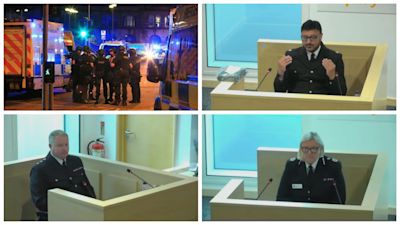A week in the Manchester Arena Inquiry: What we've learnt from Greater Manchester Police

Report by ITV Granada correspondent Amy Welch
Across a week the inquiry into the Manchester Arena terror attack has been hearing from key members of the Greater Manchester Police team on the night of the atrocity.
Here are five key findings from the week:
WHY EMERGENCY RESPONDERS WEREN'T SENT IN AT FIRST
When firearms officers first ran into the Arena on the night of 22 May, 2017, they didn't know if an active shooter was still at large.
"Operation Plato" - the pre-arranged plan for when there is a suspected marauding armed terrorist, had been declared.
PC Lee Moore, Greater Manchester Police
But after a sweep of the blast zone, it soon became "blatantly obvious" that there were no armed terrorists.
It should then have been safe for emergency responders to be sent in, to provide help to the injured.
But that message didn't get through to the man co-ordinating Greater Manchester Police's response to the atrocity.
WHY 'OPERATION PLATO' MESSAGE WAS NOT SHARED WITH EMERGENCY SERVICES
Dale Sexton, then an Inspector, ran the initial response on the night.
"Operation Plato" was declared, but he decided not to alert the fire and ambulance services to this fact.
He told the inquiry he did this because he knew everyone would then have to evacuate, leaving critically injured people at the scene, and he'd judged that it was in fact safe to stay and help the wounded.
He added that "knew he was going against national guidance and policy" in doing so - but it's a decision he believed saved lives.
Ch Insp Dale Sexton, Greater Manchester Police
WHERE WERE THE FIREFIGHTERS AND PARAMEDICS?
This week the inquiry heard that because the fire service couldn't get hold of Inspector Sexton, it took them two hours to arrive.
And that he was so overwhelmed it fell to an inexperienced radio operator to answer his calls.
The inquiry also heard that for the police officers on the ground that night, the confusion over "Operation Plato" and whether the area was safe meant their repeated requests for more paramedics were ignored.
A senior police commander described how he was left waiting for more ambulances that night - "by far and away the most challenging, traumatic and haunting of my career"
Insp Mike Smith, Greater Manchester Police, speaking to the Chair of the Inquiry.
In the end only three paramedics went into the City Room where the blast happened - it will be down to senior ambulance staff to explain why, as the inquiry progresses.
WAS THE POLICE CHIEF INDEED 'NOT THE RIGHT MAN FOR THE JOB'?
This week, the inquiry has also heard from Supt Arif Nawaz - the Greater Manchester Police silver commander in the immediate aftermath of the bombing.
When GMP's force duty officer declared "Operation Plato" that night, he did not know what it was:
When questioned as to why he didn't ask for a clarification or explanation of what "Operation Plato" was, Supt Nawaz responded "It just completely threw my thinking:"
Deputy Chief Constable Debbie Ford told the Manchester Arena Inquiry she felt Supt Nawaz was "not the right man for the job...because he hadn't been given the training or knowledge that he should have had to fulfil that role that night".
WHY WAS A MAJOR INCIDENT NOT DECLARED SOONER?
The highest ranking police officer on duty that night was Detective Constable Debbie Ford.
She was the appointed 'gold commander' on the night, and went straight to force headquarters, where one witness described her as being "like a rabbit in the headlights."
The Inquiry heard that she didn't realise "Operation Plato" status hadn't been shared with the other emergency services, or that the fire service hadn't turned up at the scene.
She admitted that the declaration of a major incident at 1am - two and a half hours after the attack - was far too late.
Dep Ch Con Debbie Ford, Former Greater Manchester Police Chief Constable
Saturday 22 May marks the fourth anniversary of the attack.
The inquiry continues.
READ MORE FROM THE INQUIRY SO FAR: